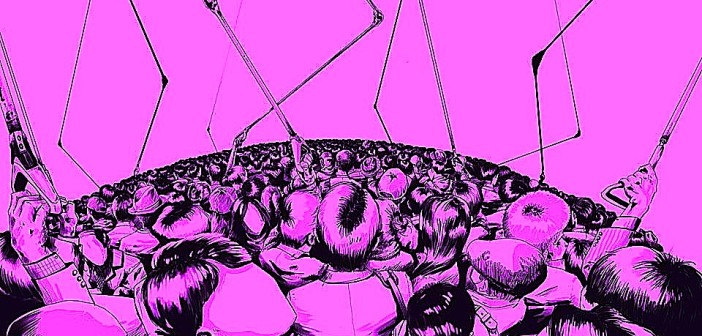It would be easy to go on at length about all irrelevant yet over publicized info that Tony Mitchell gives us in his article for Cyclic Defrost ‘Absence: A survey of music from Iran‘ with no significant insight of his own. I’m going to skip that part and focus on what he claims being Iranian means, what he claims being political means in the context of Iran, and what he claims our compilation Absence, a collection of experimental music by Iranian artists, means.
First let me point out some very obvious mistakes Mitchell has made in listening to and understanding the music and my introductory essay that accompanies it. He writes: “One noticeable factor is the immediate presence of conventional instruments such as piano on Amini’s ‘Shadows of Dusk’”. Actually Mitchell might be surprised that no piano was used on this track. He goes on to describe 9T Antiope’s track Venator noting he hears: “a female voice chanting in Farsi which seems to proclaim some degree of urgency.” I hate to disappoint you but Sara has actually chosen to sing in English, a point covered in numerous other reviews of this compilation. And finally he writes: “It’s difficult to find any Iranian characteristics anywhere on this album apart from the Persian classical elements used by Pour-Amin and Amini”.
Given that the author cannot tell the difference between a guitar and piano, two very “Western” instruments and that his own preconceptions about Iran seemingly have caused him to mistake English lyrics for ‘Farsi chanting’ it’s hard to imagine him being an expert on what sounds with Persian characteristics are. Does he mean the immediate things that come to mind; like using Persian instruments or on a deeper level of the music does he mean the ways harmony or melody and intervals are used in Persian music? Even if he does mean this, both Persian harmonies and intervals are obviously and intentionally absent from the music of the two tracks he believes to have Persian characteristics. Are Persian characteristics some imaginary thing with no further explanation used simply to jump to conclusions compatible with Mitchell’s agenda? What does a western academic, like Mitchell, imagine being Persian to mean? And why does he feel he can tell us that our music has no ‘Iranian characteristics’? The reader never finds anything to define what those characteristics even are. Nor were any of the artists involved in this compilation interviewed for this article and asked about why we, as Iranians, choose to make this sort of music, nor why we find it an important form of social, cultural and political resistance, despite the fact I discuss this in my essay.
I would like to highlight the huge chunk of my essay that was left out of Mitchell’s article, which you can read here.
The Iranian experimental music scene (which includes a huge number of musicians and artists currently working in Iran) are far more aware or our social, political and cultural situation than Mitchell is. If only he had taken the time to ask us why we make this music, or failing this if only Cyclic Defrost had insisted on giving us the space to explain ourselves. Secondly I want to stress the political point of my essay which was was that resistance has multiple forms, and does not always take the forms favoured by privileged western academics and journalists who rarely stop to think for a second about what it might be like to not be living in the west.
To me Mitchell seems concerned with telling us how to do politics better in Iran, and seemingly for him that means not to make ambient or drone music. There are many instances where he attacks the whole of the ambient/drone genre in not much of a subtle way. He writes that many of the tracks in the release ‘as with most ambient music… fade into the background’. Mitchell clearly likes some genres better than the other ones, that’s understandable, but not paying attention or even asking why an artist chooses a certain type of music for her or his output is a bias towards a certain type of art and its relation to politics and the political. Resistance can come in different forms, in different and often complex geopolitical landscapes. Choosing not to sing and attacking your audience with noise, or just placing the audience in an atmosphere or an imaginary place can be understood as political.
I’m not saying our way is the only way, but one way of seeing and approaching the situation we have been born into. As for not using traditional Persian instruments, most of us saw computer or an Atari before we saw a Tar or Setar. Does anyone ever write that it makes a western musician’s music somehow less ‘western’ or ‘authentic’ because he or she doesn’t use the piano? I don’t consider my own music somehow less Iranian because I have chosen to use a guitar.
The outdated Iranian underground (most of whom have lived outside Iran for at least 10 years) that Mitchell prefers are given so much space in western news channels and mainstream media that we just laugh at the sight or sound of them. Positioning these artists as the true underground of Iranian art just buttresses western propagandistic views on the realities of Iran and Iranian life, in ways which are no different to the propaganda of middle eastern powers. It is all part of a system that feeds on these types of newsworthy items, heroes outside of Iran, and evildoers within.
Thankfully there are people within Iran making a real difference. As I said in my essay it would be totally ignorant of us to think that day-to-day policies in Iran have no influence on us, and we don’t think this. But in different situations the right political move to achieve your goals might not be the obvious one. The right move for us may not take the form, or involve the sorts of music, favoured by western commentators. And to be honest I think we live in a very fucked up world not just here in the east, but the west is fucked up just as much, and one of the biggest parts of the problem alongside capitalism are condescending privileged assholes telling everyone outside the west what to do and how to do it.
Siavash Amini, Tehran, Iran.





